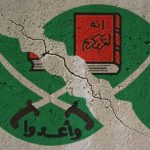By William E. Farrell, Special To the New York Times – Cairo – September 5, 1981 –
President Anwar el-Sadat, denouncing religious factionalism, deposed the nation’s Coptic Pope tonight and said he would dissolve Islamic groups that threaten national unity.
Near the end of his three-hour speech to a special session of Parliament, Mr. Sadat announced that he was canceling a 1971 decree installing Pope Shenuda III as the clerical head of Egypt’s six million Copts. The announcement caused a gasp in the packed chamber and some applause.
Mr. Sadat’s remarks came in a lengthy extemporaneous speech that followed the arrests this week of more than 1,000 critics of his regime.
Threats to Unity Are Seen
Mr. Sadat said a militant Islamic organization, the Moslem Brotherhood, ”jeopardizes the sovereignty and security of this nation” and was an ”illegitimate” entity that he had erroneously allowed to function.
He criticized the Islamic associations that are found in universities and elsewhere around the country, and said some would be ”dissolved” because they ”indulged in activities that threaten national unity.”
Mr. Sadat said he would crack down on professors and journalists engaging in activities ”detrimental to public opinion.” He said some teachers and journalists would be dismissed.
He released the names of more than 1,000 people arrested this week. He said all of them had directly or indirectly fomented religious tension and all would be accountable to a public prosecutor.
”Everything will be open,” he said, ”nothing will be behind closed doors.” He said new measures designed to curb the opposition would be submitted to a public referendum. The deposing of the Coptic Pope was a surprise, although Mr. Sadat has been angry with him for more than a year. The President feels Pope Shenuda sanctioned a protest against him by Coptic expatriates when he visited the United States a year ago. Bishops Will Replace Pope
Mr. Sadat said the Pope would be replaced by a committee of five bishops. A former Egyptian Army officer whose original name was Nazeer Gayed, Shenuda III was crowned in 1971 as the 117th successor to Saint Mark as Patriarch of the Coptic Orthodox Church and Pope of Alexandria.
There was no immediate reaction from other Copts. A question immediately arose as to whether Mr. Sadat had the power to remove Pope Shenuda from office.
The Coptic prelate is picked from within the religious community in a ceremony in which a blindfolded boy draws a name from among three placed in an ancient silver box. The Egyptian leader, who is always a Moslem, traditionally sanctions the choice. A Cautious Position on Religion
Mr. Sadat, a devout Moslem, was harsh in his comments on those he labeled ”extremists.” But he cautiously walked a line between castigating zealots and questioning the tenets of his faith.
Referring to factions that he said had fomented sectarian strife between Moslems and the Coptic Christian minority, Mr. Sadat said that ”the only governing factor is the interest of Egypt, which remains supreme.”
At several points in the speech, he used the phrase, ”No religion in politics and no politics in religion.” Mr. Sadat stood before a large pile of documents that dealt with what has been called ”sectarian s edition.”
He noted his toleration for the Moslem Brotherhood and the Islamic associations, and said both Christians and Moslems ”thought we were weak.”
The Moslem fundamentalists tried to foment a ”jihad,” or holy war, he said. ”This is absolute impudence,” Mr. Sadat said. ”They have to pay the price. I was wrong in being lenient with them.” Many Activists Arrested
According to the semiofficial newspaper Al Ahram, most of those who were arrested belonged to the Moslem Brotherhood, which has been calling for a government run according to Islamic religious law. It denounced the Western materialism that marks a part of Egyptian society.
The Moslem Brotherhood is active in several Arab countries and shares common goals, but there have been no indications that Egypt’s members have connections with those in other countries. In Syria, the Moslem Brotherhood has waged a violent campaign against the Government of Hafez al-Assad.
Emboldened by the success of the ayatollahs in Iran, the group here has also denounced the peace treaty with Israel. The early part of the address dwelt heavily on the Coptic-Moslem clash in June in a Cairo slum. He described it as a local quarrel that escalated into religious rioting because of rumor mongers and agitators.
Mr. Sadat said 17 people died in the rioting. Other reports have put the toll as high as 60. He was particularly critical of those who have questioned the efficacy of the peace treaty with Israel. Oppostion groups such as the bar association and the Socialist Labor Party also vexed Mr. Sadat because of their criticism of his peace treaty with Israel.
__________________________
A version of this article appears in print on
Sept. 6, 1981, Section 1, Page 1 of the National edition with the headline: COPTIC POPE DEPOSED IN SADAT CRACKDOWN ON RELIGIOUS GROUPS.
About the Archive
This is a digitized version of an article from The Times’s print archive, before the start of online publication in 1996. To preserve these articles as they originally appeared, The Times does not alter, edit or update them.
Occasionally the digitization process introduces transcription errors or other problems; we are continuing to work to improve these archived versions.




